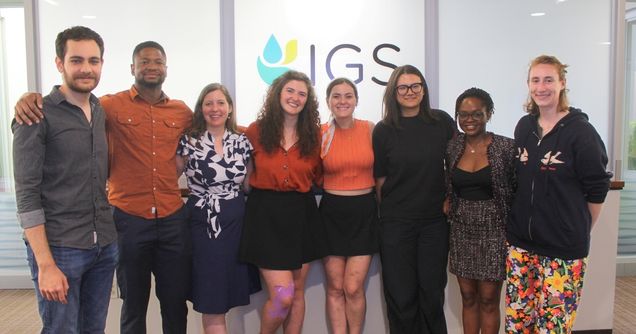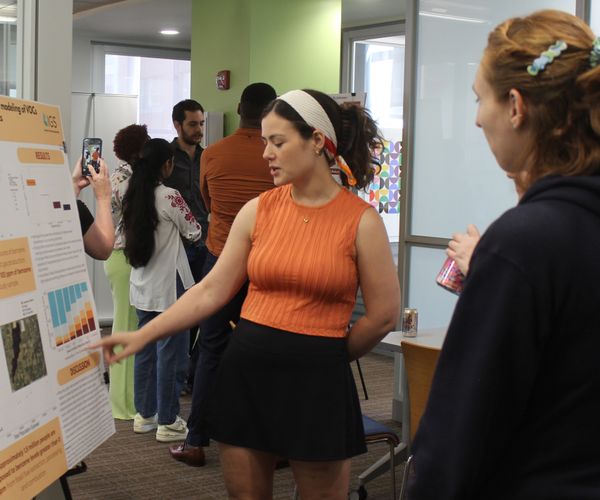Program participants reflect on their research progress, the value of mentorship, and what’s next.
By Alison Gold
Each summer, Boston University’s Institute for Global Sustainability (IGS) convenes a cohort of graduate students from across the university for its ten-week Graduate Student Summer Fellows Program. The program supports emerging sustainability scholars— providing funding, faculty mentorship, and a strong interdisciplinary peer network.
The 2025 class recently celebrated the conclusion of their fellowship at IGS’s office, with each student sharing a presentation and a research poster. Faculty, staff, and students from across BU attended the event.
Students from seven departments and four schools and colleges across BU comprised this summer’s cohort, making it the most academically varied group in the program’s four-year history. Fellows conducted research on timely issues facing the field of sustainability, including the spread of climate misinformation online, the health impacts of extreme heat, the energy demands associated with increased use of artificial intelligence, and more. The IGS Summer Fellows Program offers a rare opportunity for early-career researchers from disparate disciplines to connect and collaborate.
“Not only was I able to dive into my own research, but I was also exposed to the different topics and expertise of my colleagues and the affiliated faculty, which has spurred even more ideas on how to expand the breadth and scope of my work,” said fellow Breanna van Loenen, who is pursuing an MS in Remote Sensing and Geospatial Science in the Graduate School of Arts & Sciences.
Throughout the summer, fellows met weekly for lunch, small group discussions, and presentations from faculty in various disciplines. The IGS fellows also joined up with the Pardee Center Summer Fellows for a visit to the Massachusetts State House, sparking conversations about the policy implications of their research.
“The environmental challenges that we face require interdisciplinary solutions, and it is so valuable to be able to collaborate with others to work toward these solutions,” said fellow Sophia Tigges, who is pursuing a PhD in the Department of Earth & Environment in the Graduate School of Arts & Sciences.
“I have made so much progress on my research, and my ability to concentrate on my work has led my project in an unexpected and exciting direction.”
Each student also received funding, allowing them ample time and resources to focus on their research. Tigges added, “I have made so much progress on my research, and my ability to concentrate on my work has led my project in an unexpected and exciting direction.”

Explore how each fellow used their time in the program to advance sustainability scholarship.
Bamidele Aroboto (PhD student, Mechanical Engineering, College of Engineering)
Creating metal alloys for aerospace, nuclear, and deep-sea applications often requires energy-intensive manufacturing processes. Working with faculty advisor James Chapman, an assistant professor in the College of Engineering, Aroboto furthered his work on sustainability in high-entropy alloy manufacturing. His research integrates data science, machine learning, and materials science.
“One advancement I’ve made at IGS so far is that I was able to progress work specifically on my site analysis and density functional theory, or DFT calculations, both important steps toward my research goals,” he said.
Tati Fontana (PhD candidate, Accounting, Questrom School of Business)
Fontana is examining the Brussels Effect, a theory suggesting that European Union regulations can influence global practices. Fontana is assessing how U.S. markets reacted to the adoption of the Corporate Sustainability Reporting Directive (CSRD), an EU law requiring companies to report on their sustainability. Fontana works with faculty advisor Edward Riedl, John F. Smith Professor at Questrom School of Business. The Impact Measurement & Allocation Program at the Questrom School of Business supported her fellowship.
“During these 10 weeks, I received extensive feedback, which has allowed me to understand how the story is flowing, and also in need of adjustments, to reach both my field as well as a broader audience,” she said. “I hope that it can positively contribute to better informing both investors and policymakers.”
Mohammadamin Hajikhodaverdian (PhD student, Electrical & Computer Engineering, College of Engineering)
In AI systems, the constant movement of data between memory and processors requires tremendous amounts of energy, growing the technology’s operational costs and environmental footprint. This summer, Khodaverdian and his faculty advisor, College of Engineering Professor Ayse Coskun, continued their work on advanced 3D chip designs to streamline dataflows and boost energy-efficient performance for AI.
“The regular meetings [with the other IGS fellows] allowed me to see what other fields are working on and learn about aspects I had never considered,” he said.

Melissa Martin (PhD student, Earth & Environment, Graduate School of Arts & Sciences)
Working with IGS Director Benjamin Sovacool, a College of Arts & Sciences professor, as her faculty advisor, Martin researched how urban heat islands affect human health and increase demand for air conditioning, straining the grid. She developed a typology, or classification, of potential solutions to keep people healthy and comfortable.
“Having the interdisciplinary aspects of my colleagues, all being from different departments, and having speakers that are IGS staff and faculty coming in throughout the summer to chat with me about my work and what they found value in and what they thought was useful, or what they thought was missing, was a great way to be constantly checking: ‘am I actually doing work that is implementable, useful, and understandable to people that are outside of my specific specialty?” Martin said.
Naa Korkoi Tackie (PhD student, Emerging Media Studies, College of Communication)
Tackie is assessing how engagement patterns on the social media platform Reddit are influenced by emotions about climate change — for instance, if an emotion-laden post garners more shares and reposts. This work will help in the fight to identify and tackle viral climate misinformation and disinformation. To sort Reddit posts for analysis, Tackie uses machine learning tools. This summer, she selected tools to take her research to the next level. Her research is supported by faculty advisor Chris Wells, a College of Communication professor.
“What I’ve learned from this research is that the software tools that are used to detect emotions are not foolproof,” she said. “This summer has led me to find a more robust sentiment analysis tool that I can use to make this project better.”

Sophia Tigges (PhD candidate, Earth & Environment, Graduate School of Arts & Sciences)
Tigges, with faculty mentor Duncan FitzGerald, a College of Arts & Sciences professor, investigates how microplastics accumulate in salt marsh soils in Massachusetts. While Tigges initially intended to conduct spatial analyses to determine how microplastics move into marshes, this initial approach didn’t pan out. With ample time and funding through the fellowship, Tigges explored a new idea: using historical imagery. Ultimately, this proved to be a fruitful new direction for continued study.
“I ended up using some historical imagery to reconstruct depositional conditions on the marsh,” Tigges said. “I was able to do something really exciting with that.”
Breanna van Loenen (MS student, Remote Sensing and Geospatial Science, Graduate School of Arts & Sciences)
During her fellowship, van Loenen furthered her research on the public health impacts of the oil and gas industry with support from her faculty advisor, School of Public Health Assistant Professor Jonathan Buonocore. She used remote sensing data to track national benzene emissions and exposure. Her results confirmed that gas flaring was the primary source of benzene exposure across oil-and gas-producing regions, with approximately 1.5 million people exposed to the compound.
“I also conducted an environmental justice analysis and found that this exposure was higher in census tracts that identified largely as non white,” van Loenen said. The finding aligns with previous results, generated through a collaborative IGS and Boston University School of Public Health research project highlighting injustice in exposures to harmful emissions from oil and gas infrastructure.
Yikai Zhang (PhD student, Business Administration, Questrom School of Business)
Electric vehicle owners know that it can be challenging to find a convenient, available public charging station. Zhang is analyzing electric vehicle charging infrastructure data to quantify traffic congestion patterns, with her faculty advisors from the Questrom School of Business, Z. Justin Ren, an associate professor, and Jinglong Zhao, an assistant professor. This summer, Zhang collected data and constructed models. Her fellowship was supported by the Impact Measurement & Allocation Program at the Questrom School of Business.
“Throughout this 10-week summer fellowship, I felt really inspired by faculty speakers and also the discussions with my fellows,” Zhang said. “I am really grateful for this opportunity, and I enjoyed the connections built with fellow students.”

